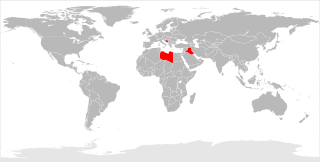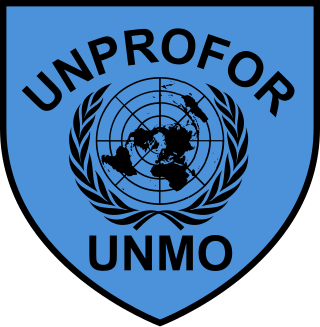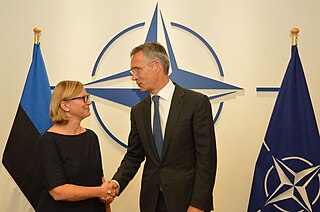
The Armed Forces of Bosnia and Herzegovina is the official military force of Bosnia and Herzegovina. The BiH armed forces were officially unified in 2005 and are composed of two founding armies: the Bosniak and Croat Army of the Federation of Bosnia and Herzegovina (VFBiH) and the Bosnian Serbs' Army of Republika Srpska (VRS).

The Italian Armed Forces encompass the Italian Army, the Italian Navy and the Italian Air Force. A fourth branch of the armed forces, known as the Carabinieri, take on the role as the nation's military police and are also involved in missions and operations abroad as a combat force. Despite not being a branch of the armed forces, the Guardia di Finanza is organized along military lines. These five forces comprise a total of 340,885 men and women with the official status of active military personnel, of which 167,057 are in the Army, Navy and Air Force. The President of the Italian Republic heads the armed forces as the President of the High Council of Defence established by article 87 of the Constitution of Italy. According to article 78, the Parliament has the authority to declare a state of war and vest the powers to lead the war in the Government.

The Armed Forces of the Slovak Republic were divided from the Czechoslovak Army after dissolution of Czechoslovakia on 1 January 1993. Slovakia joined NATO on 29 March 2004. From 2006 the army transformed into a fully professional organization and compulsory military service was abolished. Slovak armed forces numbered 19,500 uniformed personnel and 4,208 civilians in 2022.
The Army of Republika Srpska, commonly referred to in English as the Bosnian Serb Army, was the military of Republika Srpska, the self-proclaimed Serb secessionist republic, a territory within the newly independent Bosnia and Herzegovina, which it defied and fought against. Active during the Bosnian War from 1992 to 1995, it continued to exist as the armed forces of RS, one of two entities making up Bosnia and Herzegovina, until 2006 when it was integrated into the Armed Forces of Bosnia and Herzegovina. Forces of the VRS engaged in several campaigns, including Operation Corridor 92, Operation Vrbas '92, Operation Bura, and Operation Spider; they were also involved in the siege of Sarajevo, as well as the Srebrenica massacre.

The Implementation Force (IFOR) was a NATO-led multinational peace enforcement force in Bosnia and Herzegovina under a one-year mandate from 20 December 1995 to 20 December 1996 under the codename Operation Joint Endeavour.

The Stabilisation Force (SFOR) was a NATO-led multinational peacekeeping force deployed to Bosnia and Herzegovina after the Bosnian War. Although SFOR was led by NATO, several non-NATO countries contributed troops. It was replaced by EUFOR Althea in December 2004.

A no-fly zone, also known as a no-flight zone (NFZ), or air exclusion zone (AEZ), is a territory or area established by a military power over which certain aircraft are not permitted to fly. Such zones are usually set up in an enemy power's territory during a conflict for humanitarian or military reasons without consent of the enemy state, similar in concept to an aerial demilitarized zone, and usually intend to prohibit the enemy's military aircraft from operating in the region. Military action is employed by the enforcing state and, depending on the terms of the NFZ, may include preemptive attacks to prevent potential violations, reactive force targeted at violating aircraft, or surveillance with no use of force. Air exclusion zones and anti-aircraft defences are sometimes set up in a civilian context, for example to protect sensitive locations, or events such as the 2012 London Olympic Games, against terrorist air attack. A no-fly zone is generally not considered a form of aerial blockade due to its more limited scope compared to an aerial blockade.

The Yugoslav Wars were a series of separate but related ethnic conflicts, wars of independence, and insurgencies that took place from 1991 to 2001 in what had been the Socialist Federal Republic of Yugoslavia. The conflicts both led up to and resulted from the breakup of Yugoslavia, which began in mid-1991, into six independent countries matching the six entities known as republics that had previously constituted Yugoslavia: Slovenia, Croatia, Bosnia and Herzegovina, Montenegro, Serbia, and Macedonia. SFR Yugoslavia's constituent republics declared independence due to unresolved tensions between ethnic minorities in the new countries, which fueled the wars. While most of the conflicts ended through peace accords that involved full international recognition of new states, they resulted in a massive number of deaths as well as severe economic damage to the region.

The United Nations Protection Force was the first United Nations peacekeeping force in Croatia and in Bosnia and Herzegovina during the Yugoslav Wars. The force was formed in February 1992 and its mandate ended in March 1995, with the peacekeeping mission restructuring into three other forces.
The Kosovo Campaign Medal (KCM) is a military award of the United States Armed Forces established by Executive Order 13154 of President Bill Clinton on May 3, 2000. The medal recognizes military service performed in Kosovo from March 24, 1999 through December 31, 2013.

Operation Deliberate Force was a sustained air campaign conducted by NATO, in concert with the UNPROFOR ground operations, to undermine the military capability of the Army of Republika Srpska, which had threatened and attacked UN-designated "safe areas" in Bosnia and Herzegovina during the Bosnian War with the Srebrenica genocide and Markale massacres, precipitating the intervention. The shelling of the Sarajevo marketplace on 28 August 1995 by the VRS is considered to be the immediate instigating factor behind NATO's decision to launch the operation.
The Yugoslav Wars were a series of armed conflicts on the territory of the former Socialist Federal Republic of Yugoslavia (SFRY) that took place between 1991 and 2001. This article is a timeline of relevant events preceding, during, and after the wars.

Bosnia and Herzegovina–Russia relations are the bilateral relations between the two countries, Bosnia and Herzegovina and Russia. Bosnia is one of the countries where Russia has contributed troops for the NATO-led stabilization force. Russia recognized the independence of Bosnia and Herzegovina on 27 April 1992.

Peter Erben is a senior electoral manager with global experience in directing, advising and supporting complex elections in post-conflict, transitional and developing countries, usually working for or along with the European Union, the Organization for Security and Co-operation in Europe (OSCE), the International Foundation for Electoral Systems and the United Nations.

Headquarters Allied Force Command Heidelberg was a formation of the North Atlantic Treaty Organization (NATO) responsible for providing deployable joint staff elements (DJSE) in support of NATO operations worldwide. It was headquartered at Campbell Barracks, Germany, and reported to the Joint Force Command Brunssum (JFCBS). During the War in Afghanistan, it provided command and control elements to the International Security Assistance Force (ISAF). It was disbanded on 1 April 2013.

A confrontation between Russian forces and NATO forces over the Pristina International Airport occurred on 12 June 1999, in the aftermath of the Kosovo War. Russian troops occupied the airport ahead of a NATO deployment, resulting in a tense stand-off, which was resolved peacefully.

An incident took place on the Albania–Yugoslav border in April 1999 when the Yugoslav Army shelled several Albanian border towns around Krumë, Tropojë. In these villages, refugees were being housed after fleeing the ongoing war in Kosovo by crossing into Albania. On 13 April 1999, Yugoslav infantry entered Albanian territory to close off an area that was used by the Kosovo Liberation Army to stage attacks against Yugoslav targets.
The Leaders of the Yugoslav Wars listed below comprise the important political and military figures of the Yugoslav wars.

Since Estonia joined NATO in 2004, Estonia has participated in many joint military operations using its Estonian Defence Forces. Estonia has also participated in NATO-led military and peacekeeping operations before 2004.















